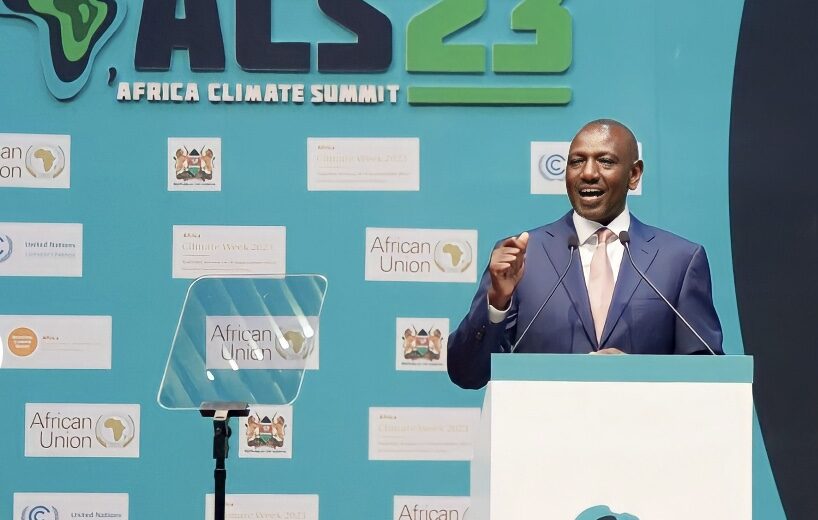
“Global Leaders Unite at Nairobi Climate Summit: A Bold Call for Global Action”
“Historic Declaration Sets Ambitious Goals to Tackle Climate Crisis, Promote Green Growth, and Elevate Africa’s Role”
In a historic gathering African Heads of State and Government at the inaugural Africa Climate Summit (ACS) held in Nairobi, Kenya, leaders from across the continent came together to deliver a resounding call to action on climate change. The Nairobi Declaration, adopted on September 6, 2023, not only underscores the urgent need to address climate change but also positions Africa as a critical player in the global efforts to combat the crisis.
The ACS brought together global leaders, intergovernmental organizations, Regional Economic Communities, United Nations Agencies, the private sector, civil society organizations, indigenous peoples, local communities, farmer organizations, children, youth, women, and academia. This diverse and powerful coalition sent a clear message: climate change is the single greatest challenge facing humanity, and Africa is ready to be part of the solution.
A Continent at Risk: Africa Warming Faster Than the Rest of the World
The Nairobi Declaration begins by acknowledging the grim reality that Africa is warming faster than any other part of the world. The Intergovernmental Panel on Climate Change (IPCC) warns that if current trends continue, Africa will face increasingly adverse impacts, including prolonged droughts, devastating floods, and wildfires that threaten economies, health, education, peace, and security.

It’s a stark reminder that climate change is not a distant threat but a pressing crisis affecting millions of lives and livelihoods across the continent. The declaration emphasizes that while Africa is not historically responsible for global warming, it bears the brunt of its effects.
Africa’s Vision for a Climate-Positive Future
What sets the Nairobi Declaration apart is its unwavering commitment to a climate-positive future. African leaders have identified the continent’s immense potential as a game-changer in the global fight against climate change. With over 40 percent of the world’s renewable energy resources, Africa is ready to pioneer a climate-positive pathway, becoming a cost-competitive industrial hub while supporting other regions in achieving their net-zero ambitions.
Moreover, Africa’s natural assets, from the Congo forest to its savanna grasslands and marine reserves, position it as one of the largest carbon sinks globally. The declaration highlights the progress made by African countries in promoting land and ecosystem restoration, acknowledging Africa’s role in mitigating climate change.
A Call for Global Solidarity
The Nairobi Declaration is not just a message from Africa; it’s a call to the global community for urgent and collective action. African leaders urge the world to reduce emissions in line with the Paris Agreement, fulfill promises of $100 billion in annual climate finance, phase out coal, and abolish fossil fuel subsidies. Swift operationalization of the Loss and Damage facility agreed at COP27 is also stressed.

Africa’s readiness to create an enabling environment for green growth and inclusive economies is underscored. However, the declaration highlights the glaring disparity in renewable energy investments, calling for a tenfold increase in finance to reach the 300 GW target by 2030.
A Bold Vision for Africa’s Green Future
The Nairobi Declaration outlines a bold vision for Africa’s future. It calls for climate-positive investments that catalyze economic growth, create jobs, and promote green production and supply chains. Leaders pledge to prioritize just energy transitions, renewable energy generation, climate-aware agriculture, and the protection of nature and biodiversity.
Furthermore, the declaration emphasizes the need for continental collaboration, regional grid interconnectivity, and the operationalization of the Africa Continental Free Trade Area (AfCFTA) Agreement. Green industrialization and agricultural sustainability are identified as critical pathways to achieving climate goals while ensuring food security.
From Words to Action: Africa’s Climate Commitments
A key takeaway from the Nairobi Climate Summit is that Africa is ready to transform its climate commitments into concrete actions. Leaders pledge to develop and implement policies, regulations, and incentives to attract global investment in green growth and inclusive economies.
By leapfrogging traditional industrial development and embracing renewable energy, Africa aims to not only limit its emissions but also contribute significantly to global decarbonization efforts. This commitment extends to halting biodiversity loss, restoring degraded lands, and supporting smallholder farmers and indigenous communities.
A Transformative Vision for Global Financing
One of the most innovative aspects of the Nairobi Declaration is its vision for transforming global financing. African leaders recognize that multilateral finance reform is necessary but not sufficient to meet climate financing needs. They propose a global carbon taxation regime, including a carbon tax on fossil fuel trade, maritime transport, and aviation, to fund climatepositive investments at scale.
This groundbreaking proposal aims to ensure dedicated resources for climate action while mitigating geopolitical interests. It’s a visionary approach that could revolutionize climate finance on a global scale.
A Continent’s Call for Global Partnership
The Nairobi Declaration is a powerful testament to Africa’s determination to lead in the fight against climate change. It calls upon world leaders to recognize that decarbonizing the global economy is not only a necessity but also an opportunity to promote equality and shared prosperity.
African leaders invite development partners from around the world to align their resources with Africa’s goals, promoting sustainable utilization of the continent’s natural assets. They emphasize the need for reforms in the multilateral financial system and global financial architecture to support climate action and development in Africa.
The Road Ahead: A Climate-Positive Africa
In closing, the Nairobi Declaration sets a bold and ambitious path for Africa’s climate-positive future. It positions the continent as a key player in global climate action, emphasizing the need for solidarity and collective efforts to combat climate change.
As the world faces a climate crisis of unprecedented proportions, Africa’s message is clear: the time for action is now, and the continent is ready to lead by example. The Nairobi Climate Summit may well be remembered as a turning point in the global fight against climate change, and its impact will resonate far beyond the African continent.

Leave a Reply